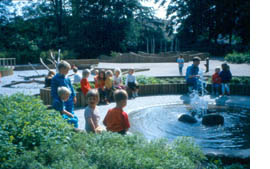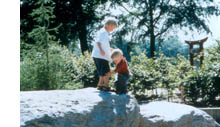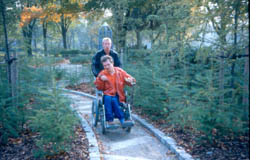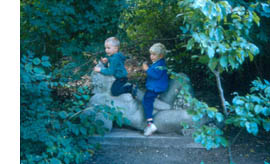|
|
|
|
|
|
|
|
|
|
|
|
 |
|
 |
|
|
|
|
Designs on PlayBack to the main page on Designs on Play Helle NebelongThe Garden of Senses in FaelledparkenThe third play area I want to tell about is the Garden of Senses in Faelledparken. It is an example of an accessible space for children with disabilities.
I designed a garden, which should be like a maze with winding paths, leading the visitor past many different experiences.
I went round Copenhagen's material yards and found a lot of useably leftover materials, which each contained a part of history: Old paving tiles from the Town Hall Square, granite blocks from an old bridge, sculptures from The Norrebro Park - all of them just right for a garden of senses!
The sketches became working drawings and the construction work got under way.
The Garden of Senses was opened in 1996. The six sculptures of the senses were wrapped up in colourful fabric and the children helped the park manager to unwrap them: The Sense of Touch, The Sense of Fragrance, The Sense of Taste, The Sense of Vision and The Sense of Hearing.
The idea behind the Garden of Senses is to give children a glimpse of the richness of nature, in order to awaken their interest, help them to learn about nature and to respect it. The first Gardens of Senses were created in connection with homes for children and young people with multiple disabilities, who were unable to go out and experience "real" nature. These gardens are usually small plots just outside the doors of their homes. The Garden of Senses in Faelledparken is the largest in Denmark and was the first to be open to the general public. It has been designed to be explored and enjoyed by adults and children of all ages. If you open your eyes, prick up your ears, widen your nostrils and give full rein to your curiosity, you will experience a garden full of surprises, where you can make use of all your senses. There is a wide variety of plants here: some have sweet and spicy scents. Others display beautiful colours or exotically shaped flowers and leaves;
The Garden of Senses has become popular and has many visitors. Many blind and handicapped people also visit and use the garden. Children of all ages come and train - although they do not realise it - their mobility and concentration. A bronze alphabet has been attached in the maze, so that one can spell from the first to the last.
An experience in itself is the sight of Hercules and the goddesses surrounded by all the greenery. This old sculpture group used to stand in the Norrebro Park in Copenhagen, but it was vandalised so it was taken down and declared unsuitable to be reinstated. In the Garden of Senses it doesn't matter if the sculpture is missing a nose-tip and half an arm, so now the sculpture group has been reinstated to be honoured and valued. Decay is suddenly beautiful and mystical in this green setting. Back to the Top of the Page | Next Page, The Children's Millennium Garden |

 Previously it was an old, run down playground or you could say a
big asphalt dessert which needed total renovation.
Previously it was an old, run down playground or you could say a
big asphalt dessert which needed total renovation. There
are several Wonder Spaces with Tangible Sculptures - one sculpture
to each of our senses. There are Crossings, a Riverside Scenery
with rocks and a Lake Scenery without water, a Lavender Island,
a Maze of stakes. A Bamboo shrub, a small Garden of Fragrance with
a fountain, prickly evergreens, shrubbery with old, crumbling sculptures,
a Pavilion Garden, a grove of Chinese temple trees, a Butterfly
Garden and a lot of other elements to discover.
There
are several Wonder Spaces with Tangible Sculptures - one sculpture
to each of our senses. There are Crossings, a Riverside Scenery
with rocks and a Lake Scenery without water, a Lavender Island,
a Maze of stakes. A Bamboo shrub, a small Garden of Fragrance with
a fountain, prickly evergreens, shrubbery with old, crumbling sculptures,
a Pavilion Garden, a grove of Chinese temple trees, a Butterfly
Garden and a lot of other elements to discover.
 The
sculptures were made by a group of young artists and they decided
themselves to create a sixth sculpture, The 6th Sense Gateway. Seen
from outside, it is all quite anonymous, but if you go through the
gate and turn around, you will see all the religious symbols of
the world.
The
sculptures were made by a group of young artists and they decided
themselves to create a sixth sculpture, The 6th Sense Gateway. Seen
from outside, it is all quite anonymous, but if you go through the
gate and turn around, you will see all the religious symbols of
the world.
 The
garden is full of contrasts. The stones are also varied: rough and
smooth; round and angular; big rocks for climbing, small stones
that rattle in your hand; There are lots of surprises.
The
garden is full of contrasts. The stones are also varied: rough and
smooth; round and angular; big rocks for climbing, small stones
that rattle in your hand; There are lots of surprises.